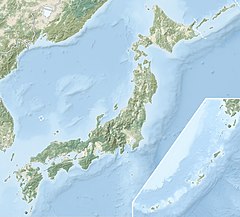Yamasaki Domain
| Yamasaki Domain 山崎藩 | |
|---|---|
| under Tokugawa shogunate Japan | |
| 1615–1871 | |
| Capital | Yamasaki jin'ya |
| Area | |
| • Coordinates | 35°00′10.6″N 134°32′22.4″E / 35.002944°N 134.539556°E |
| • Type | Daimyō |
| Historical era | Edo period |
• Established | 1615 |
• 1615 | Ikeda clan |
• 1640 | Matsui-Matsudaira clan |
• 1649 | Ikeda clan |
• 1678 | Honda clan |
• Disestablished | 1871 |
| Today part of | part of Hyōgo Prefecture |

Yamasaki Domain (山崎藩, Yamasaki-han) was a feudal domain under the Tokugawa shogunate of Edo period Japan, located in Harima Province in what is now the southwestern portion of modern-day Hyōgo Prefecture. It was centered around the Yamasaki jin'ya which was located in what is now the town of Yamasaki, Hyōgo. It was initially controlled by a cadet branch tozama daimyō Ikeda clan, but later came under the control of a cadet branch of the Honda clan. It was also called Shisō Domain (宍粟藩, Shisō-han) [1][2][3]
History
[edit]In 1615, the 1st daimyō of Okayama Domain, Ikeda Tadatsugu suddenly died at the age of 16 under somewhat suspicious circumstances. His mother, Tokuhime was a daughter of Tokugawa Ieyasu, and she asked that the Tokugawa shogunate separate out the 35,000 koku of his holdings in Harima Province as a separate domain for his younger brother, Ikeda Teruzumi. In 1631, Ikeda Teruzumi added an additional 30,000 koku from his younger brother, Ikeda Teruoki from Ako Domain. However, soon afterwards the domain erupted into a civil war between the two chief karō, Ogawa Shiroemon and Iori Iki. Takebe Masanaga of neighboring Hayashida Domain unsuccessfully attempted an arbitration, and in 1640 the shogunate was forced to directly intervene, ordering the seppuku of 20 senior retainers. Under most circumstances, this would have included Ikeda Teruzumi himself, but since he was a grandson of Tokugawa Ieyasu, he was demoted to a kokudaka of 10,000 koku and reassigned to Shikano Domain in Inaba Province. The Ikeda were replaced by Matsudaira Yasuteru, formerly of Kishiwada Domain. He ruled from 1640 to his transfer to Hamada Domain in 1649. Another cadet branch of the Ikeda clan came to Yamasaki from the Kojima sub-domain of Okayama Domain and riled to 1672, when the line went extinct due to lack of an heir.
Yamasaki Domain was then assigned to a cadet branch of the Honda clan from the Kōriyama-Shinden sub-domain of Kōriyama Domain of Yamato Province. The Honda ruled until the Meiji restoration. The 8th daimyō Honda Tadachika opened the han school Shisaikan" and made an effort to rebuild the clan's finances. However, after dispatching troops for the First Chōshū expedition in the Bakumatsu period, the clan's finances were ruined, and as a result, it was not possible to dispatch troops to the Second Chōshū expedition. At the time of the Battle of Toba-Fushimi, the clan refused to participate due to lack of funds. In 1871, with the abolition of the han system, the domain became Yamasaki Prefecture, which was merged with Shikama Prefecture, which in turn became part of Hyogo Prefecture.
The clan was ennobled with the kazoku peerage title of shishaku (viscount) in 1884.
Holdings at the end of the Edo period
[edit]As with most domains in the han system, Yamasaki Domain consisted of several discontinuous territories calculated to provide the assigned kokudaka, based on periodic cadastral surveys and projected agricultural yields.[4][5]
- Harima Province
- 34 villages in Shisō District
List of daimyō
[edit]# Name Tenure Courtesy title Court Rank kokudaka  Ikeda clan, 1615-1871 (Tozama)
Ikeda clan, 1615-1871 (Tozama)
1 Ikeda Teruzumi (池田輝澄) 1615 - 1640 Iwami-no-kami (石見守); Jijū (侍従) Junior 4th Rank, Lower Grade (従四位下) 38,000 -> 68,000 koku  Matsui-Matsudaira clan, 1640-1649 (Fudai)
Matsui-Matsudaira clan, 1640-1649 (Fudai)
1 Matsudaira Yasuteru (松平康映) 1640 - 1649 Awa-no-kami (淡路守) Junior 5th Rank, Lower Grade (従五位下) 50,000 koku  Ikeda clan, 1649-1678 (Tozama)
Ikeda clan, 1649-1678 (Tozama)
1 Ikeda Tsunemoto (池田恒元) 1649 - 1671 Bingo-no-kami (備後守) Junior 5th Rank, Lower Grade (従五位下) 30,000 koku 2 Ikeda Masachika (池田政周) 1671 - 1677 Bizen-no-kami (豊前守) Junior 5th Rank, Lower Grade (従五位下) 30,000 koku 3 Ikeda Tsuneyuki (池田恒行) 1677 - 1678 -none- - none - 30,000 koku  Honda clan, 1678-1871 (Fudai)
Honda clan, 1678-1871 (Fudai)
1 Honda Tadahide (本多忠英) 1679 - 1718 Higo-no-kami (肥後守) Junior 5th Rank, Lower Grade (従五位下) 10,000 koku 2 Honda Tadamichi (本多忠方) 1718 - 1731 Higo-no-kami (肥後守) Junior 5th Rank, Lower Grade (従五位下) 10,000 koku 3 Honda Tadaoki (本多忠辰) 1731 - 1750 Higo-no-kami (肥後守) Junior 5th Rank, Lower Grade (従五位下) 10,000 koku 4 Honda Tadato (本多忠堯) 1750 - 1761 Yamato-no-kami (大和守) Junior 5th Rank, Lower Grade (従五位下) 10,000 koku 5 Honda Tadayoshi (本多忠可) 1761 - 1788 Higo-no-kami (肥後守) Junior 5th Rank, Lower Grade (従五位下) 10,000 koku 6 Honda Tadaoki (本多忠居) 1788 - 1812 Yamato-no-kami (大和守) Junior 5th Rank, Lower Grade (従五位下) 10,000 koku 7 Honda Tadataka (本多忠敬) 1812 - 1834 Higo-no-kami (肥後守) Junior 5th Rank, Lower Grade (従五位下) 10,000 koku 8 Honda Tadachika (本多忠敬) 1834 - 1869 Higo-no-kami (肥後守) Junior 5th Rank, Lower Grade (従五位下) 10,000 koku 9 Honda Tadaaki (本多忠明) 1869 - 1871 Hizen-no-kami (肥前守) 4th Ranke (正四位) 10,000 koku
See also
[edit]Further reading
[edit]- Bolitho, Harold. (1974). Treasures Among Men: The Fudai Daimyo in Tokugawa Japan. New Haven: Yale University Press. ISBN 978-0-300-01655-0; OCLC 185685588
References
[edit]- ^ Nakayama, Yoshiaki (2015). 江戸三百藩大全 全藩藩主変遷表付. Kosaido Publishing. ISBN 978-4331802946.(in Japanese)
- ^ Nigi, Kenichi (2004). 藩と城下町の事典―国別. Tokyodo Printing. ISBN 978-4490106510.
- ^ Papinot, E (1910). Historical and Geographic Dictionary of Japan. Tuttle (reprint) 1972.
- ^ Mass, Jeffrey P. and William B. Hauser. (1987). The Bakufu in Japanese History, p. 150.
- ^ Elison, George and Bardwell L. Smith (1987). Warlords, Artists, & Commoners: Japan in the Sixteenth Century, p. 18.


